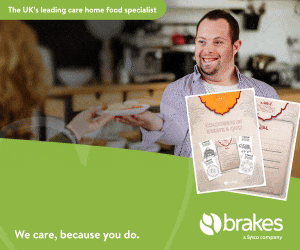Care Home and Hospital Catering Forum review
The inaugural Care Home and Hospital Catering Forum brought together delegates from across the two sectors under the banner ‘The Power of Food’: Sue Dunk reports

The Care Home and Hospital Catering Forum took place on 29th November 2018 at Haberdashers’ Hall, London, where a packed programme of speakers, chef demonstrations and exhibition stands captivated representatives from care homes and NHS Trusts alike.
Many of the challenges faced by food service providers in both sectors are similar, from catering for people with a reduced or suppressed appetite, to those suffering from food allergies or intolerances. In addition, there has long been a call for a more ‘joined up’ approach to care, with social care providers working much more closely with the NHS to deliver appropriate care solutions to every individual.
Taking as its theme ‘The Power of Food’, the Forum looked to address these common challenges and signpost a way forward.
More than fuel
The day kicked off with a keynote address by Dr Liz Jones, a nurse by training who has over 40 years’ experience in healthcare and now owns consultancy company Better Care Environments which helps people improve care by focusing on their care surroundings.
Liz set the scene for the content to come, summarising the current issues – including the pressing need to catch those who are potentially on a route to malnutrition – and drawing on her own experiences of her mother’s Extra Care housing environment to demonstrate “the healing power of food” and the kinds of things that can be done in a care setting to improve the food offer.
Referring to Maslow’s Hierarchy of Needs to show that food is more important than just a fuel, Liz talked us through the hierarchy from the most basic requirements of survival followed by safety, to the role food has to play in meeting our social and psychological needs. “We like to belong, it’s part of the human condition,” said Liz. “Almost everyone eats more when they eat with other people.”
She made the point that a lot of the women now in care homes would have had the traditional role of providing food for others, which would have defined who they were, given them self esteem. “If someone stopped me cooking I might feel diminished by not being able to do that any more,” she said, and went on to explain how people in her mum’s establishment, Old Mill House in Oldham, were encouraged to cook for one another. “It’s about eating together in a more creative way than just putting people together in a dining room.”
Even being able to help peel carrots or wash up is important, said Liz. “If you’ve always been a feeder you can’t suddenly become one of the fed – you need to keep that identity.” Subtle messages reinforcing identity and self-actualisation could also include giving people in your care regional specialities they would have grown up with and still identify with, she added.
Allergens
Next up was Helen Willis, a registered dietitian working for apetito and Wiltshire Farm Foods, whose illuminating presentation explained the difference between allergy (an acute reaction by the body’s immune system which can be fatal), sensitivity (the normal effects of a food are exaggerated) and intolerance (which causes unpleasant symptoms including vomiting, diarrhea and sneezing but doesn’t involve the immune system).
She highlighted some alarming statistics supporting the rise in allergies, including the fact that there are some 30,000 admissions to hospital per year for allergic reactions, and that there has been a seven-fold increase in attacks in the last decade. A quarter of households now include someone with an allergy or intolerance, more and more people are interested in clean labels and free-from foods (which are more expensive to buy) and care homes will see increasingly more of these individuals coming through their doors, she said. Staff training to keep on top of allergen-safe meals was crucial. “There is no food we could give our residents or patients that could impact more than giving them the wrong food if they’ve got an allergy,” Helen told the audience.
Hydration
Hydration is a vital part of good nutrition and Derek Johnson, co-founder of Nutrition & Hydration Week and an independent consultant and trainer at Nutrition & Hydration Associates, covered the importance of fluid intake and the urgent requirement for delegates to get those in their care to understand why they need to drink.
He covered the need to make sure fluids are readily available and physically accessible by all – residents, patients, service users, visitors, staff and other professionals coming into the hospital or care home – and highlighted the benefits of good hydration such as helping to get rid of toxins in the body which can reduce the impact of pressure sores, or regulating body temperature.
Derek pointed out that for many of us in the room reaching for a drink comes naturally, but added: “Lots of the people we look after don’t realise they’re thirsty, so you need to ask them, ‘are you thirsty?’ and offer a drink.”
Case studies
The day included two case study presentations demonstrating best practice in both a hospital and a care home setting.
Robert Cormack, General Manager of Catering at Guy’s and St Thomas’ NHS Foundation Trust, gave the audience an insight into how he has achieved the objective he set himself on joining the Trust in 2014 – namely, to “improve and enhance patient catering”. This involved “breaking the mould” to introduce bespoke services relevant to individual departments, such as a cook-freeze service for wards where demand was unpredictable, or the introduction of a finger food menu so that elderly people who didn’t want big meals “could snack and graze their way through the day”.
The presentation by Fiona White, Associate Director of Operations, Sunrise Senior Living & Gracewell Healthcare, demonstrated just how much the dining element can contribute towards a CQC ‘Outstanding’ rating – which Sunrise of Eastbourne has recently been awarded. She explained the home’s commitment to high-end restaurant quality food and how the creation of a sensory environment for enriched dining on the Reminiscence unit has resulted in fewer UTIs and pressure sores, and a generally “happier” community. ‘Tim’s Story’, whereby a resident with end-stage dementia began to be able to feed himself again after experiencing the fine dining area, was truly moving.
It is the whole culture around food at Eastbourne that makes the difference, said Fiona. “Food, dining and hydration are embedded into everything we do, all day long – from afternoon teas and baking with local nursery school pupils to the residents’ business of baking dog biscuits which they sell for charity to local vets, grooming parlours, etc.”
Training
During the course of the day the importance of training was mentioned repeatedly, and delegates heard from Paul Mannering, Prinicpal of the HIT Chef Academy, which offers apprentices the opportunity to gain knowledge and expertise, providing them with the tools to develop a successful career. By investing in this form of training, he said, care homes would get chefs with an understanding of budgets, seasonality, when to buy and how to put menus together. “You would be able to cut down on agency chefs and get the consistency and quality you need,” he said. Programmes from 12 months to 2 years are fundable through the Apprenticeship Levy.
Paul went on to state that HIT Training now offers the new Level 2 Award in Professional Cookery in Health and Social Care, which can be added on to an apprenticeship or delivered as a separate entity, and Simon Cleaver, Director of Membership, Confederation of Tourism & Hospitality (CTH), then took to the stage to explain about the new award in more detail.
Being independently verified and externally monitored the new qualification “is meaningful and portable”, he said; it’s up to date with IDDSI requirements and eligible for funding.
Next generation
The prize for ‘most shocking presentation of the day’ must go to Norman Dinsdale, Senior Lecturer, Sheffield Business School, whose pictorial evidence of the ‘slop’ that is still served up in some care homes and hospitals even today was an eye opener and a knee in the groin for those who believe we have turned the corner in terms of good nutritional care and food presentation.
Norman’s research into catering for the next generation of care home occupants was covered in a previous issue of Care Home Catering (Winter 2017) but his update for the Forum included the controversial findings that few of the operators/managers he interviewed held their catering staff in high regard and among the chefs themselves there was a worrying lack of knowledge around key topics such as IDDSI. In the (largely local authority) care homes surveyed it seems there is no awareness of the changing tastes and expectations care homes will need to cater for.
Cognitive health
The most in-depth presentation of the day was delivered by Amanda Williams, Managing & Technical Director of Cytoplan. With insufficient space here to do ‘Nutrition and cognitive health: food as a helping hand’ justice, readers will have to wait until the Spring issue for more insight into what Amanda had to say. In brief, though, delegates heard about the latest research into nutrition and cognitive decline, the Nutrition Gap (the difference between the nutrients we are ingesting through a normal diet and the levels we need), the negative impact of modern farming methods and the food industry, how we can address micro- and macro-nutrient shortfalls, and why we should all be concerned…
Demonstrations
Adriano Carvalho, Head Chef at Gracewell of Newbury and recently crowned Care Dine With Me champion 2018, is passionate about preparing and presenting appetising dishes for those on special diets. He shared his knowledge and expertise with those in the room, talking through the new IDDSI framework and demonstrating how to give people suffering from dysphagia their own version of texture modified cheese and biscuits (with grapes!) that looks just like the real thing, as well as some simple ideas for fortified smoothies.
After a panel discussion pulling together a number of strands arising from the day’s presentations delegates went on their way with plenty of inspiration to take into their own workplaces.
Thanks to all our sponsors: Crusha, Filta Group, Fruitypot, Green Gourmet, JJ Foodservice, Kerrymaid, Mulrines, Pelican Procurement Services, Streamline Foods, Tetley and Yeo Valley.








